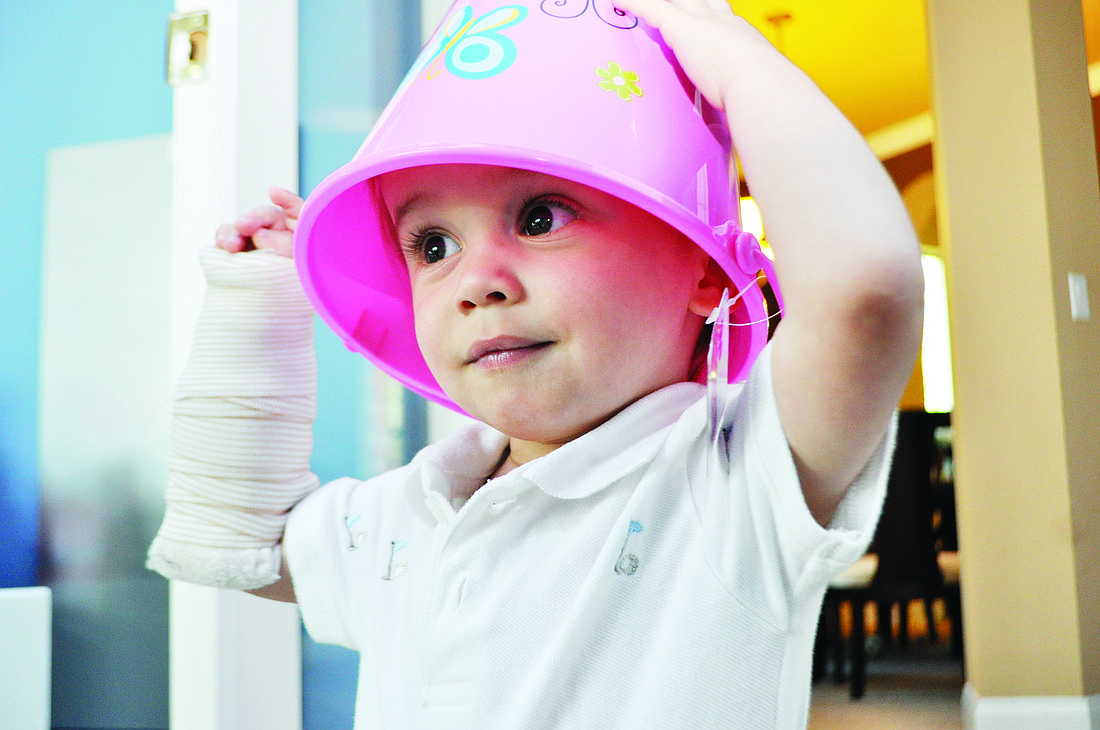- April 26, 2024
-
-
Loading

Loading

A benefit for Cooper Ascone, who has Shone’s complex and high pulmonary pressure, is April 28.
Ring the doorbell to the Ascone’s Grand Haven home and 2-year-old Cooper will answer, balancing bravely in front of his father as his twin sister, Chloe, peers curiously past the drapes over a side window.
He stands about two-and-a-half feet tall, and has a wide smile and blonde hair that peeks below the rim of a green toy bucket whenever he flips it over to wear it like a helmet.
You would never know by looking at him, but Cooper also has post traumatic stress disorder, a condition which formed after he had two open-heart surgeries in October and January. A fundraiser for his operations will be held this weekend.
Almost every night, he wakes up screaming — not from memories of the surgeries, his doctors say, but because he remembers the needles, and the tubes and being in the hospital.
“After a year, he had tripled his birth weight. He hit all the benchmarks — and faster than his sister,” said Cooper’s dad, Tom, cradling the youngest of his three kids, 3-month-old Carter.
But soon after that, Cooper began getting constipated. He would wake up three, four times per night. He started losing weight.
The doctors thought maybe he had celiac disease. But a cardiac catheterization showed otherwise.
“I had never heard of Shone’s complex,” Ascone said, sitting in his dining room, explaining the facts, item by item, seemingly by rote. “But (Cooper) might not have ever woken up one day — that’s how sick he is.”
He also has pulmonary hypertension due to a severely narrowed aorta and mitral valve — both of which, Ascone says, doctors call “one of the worst they’ve ever seen.”
Shone’s complex is a rare congenital heart condition that is usually discovered in utero or shortly after birth. In the few past cases the Ascones have found, children with the disease are constantly ill, often tired and more apt to become short of breath — all things which couldn’t be further from reality for Cooper.
“He just looks smaller than his sister. He’s happy and he’s energetic,” Ascone said. “Everybody asks, ‘How do you do it every day?’ Well, he smiles every day. I come home and he smiles, gives me a hug and
a kiss. That’s how I do it. He’s special.”
In October, Cooper went in for an emergency aorta repair. A week later, he took his first steps. He began gaining weight. Then, in January, he “leveled off.” Tests showed the left side of his heart was expanding.
He then had his second surgery to fix another narrowed valve. “They didn’t want to do too much because they were afraid his heart would stop,” Ascone said. “We know, in reading, that we’re in for a lifetime’s worth of surgeries for him.”
But recently, Tom and his wife, Jennifer, have tried to stay away from research and journal articles.
“I don’t want to read that my son is going to die next year,” Ascone said. “He’s in heart failure. It’s a very mild form of heart failure, but his heart is not pumping the way it’s supposed to.”
So they have looked into alternatives — plastic heart valves, bovine valves — but each one comes with a catalog of risks to consider. Cooper is not a candidate for heart or lung transplant, either, since his cardiac pressure is too high and, as his dad says, “lungs don’t come that size.”
For now, the Ascones live month to month, running tests and praying that the five medications Cooper is taking — including Viagra, for the hypertension — help to relieve pressure on his organs.
Watching Cooper bend for trucks and toys, his father explained that his disease is so rare that even out-of-state specialty clinics only do a handful of heart valve replacements for children per year. So, for now, they monitor his weight gain, breathing patterns and activity.
The bigger he gets, the smaller the chance of fatality during surgery.
“Every time we go (to the doctor), we find out something else that — ” Ascone paused, nestling Carter deeper into the fold in his arm. “It’s a blow. It’s a blow to the gut. We’re very fortunate that he’s stayed alive seven to eight months just to get us where we are now.”
In May, Cooper will have more tests to see if a third surgery should be scheduled in early summer.
“The little guy just can’t catch a break,” Ascone added, explaining that Cooper recently broke his wrist chasing a Mickey Mouse toy off the back of the couch.
Then Cooper, who was playing in a room nearby, lost his footing and plopped on the ground.
“Safe!” his mother said, as if his tumble were a triumph. Cooper looked around sheepishly then slowly began to smile. He knew, if only by the look in his mother’s eyes, that he was going to be all right.
HELP BABY COOPER
Although Cooper Ascone’s father, Tom, has tried not to think about how much has already been spent on Cooper’s treatment, he estimates the amount at more than $220,000. That’s why family friend and fellow firefighter Jessica Forte, 24, along with the local firefighters union, the Palm Coast Volunteers and the Elks Lodge have organized a benefit event Saturday, April 28.
“We just want everyone to come together in support of Cooper,” Forte said. “The medical bills and the medication — obviously, it all adds up.”
A week before the event, it had already sold out by more than 50 tickets, and a future golf tournament is planned, as well.
“I’m humbled by the support that Cooper’s receiving,” Tom Ascone said. “I turn around and it’s on message boards and people are talking about him. He’s a 2-year-old little boy, and there are so many people who care.”
Donations can also be given by calling 986-2302.